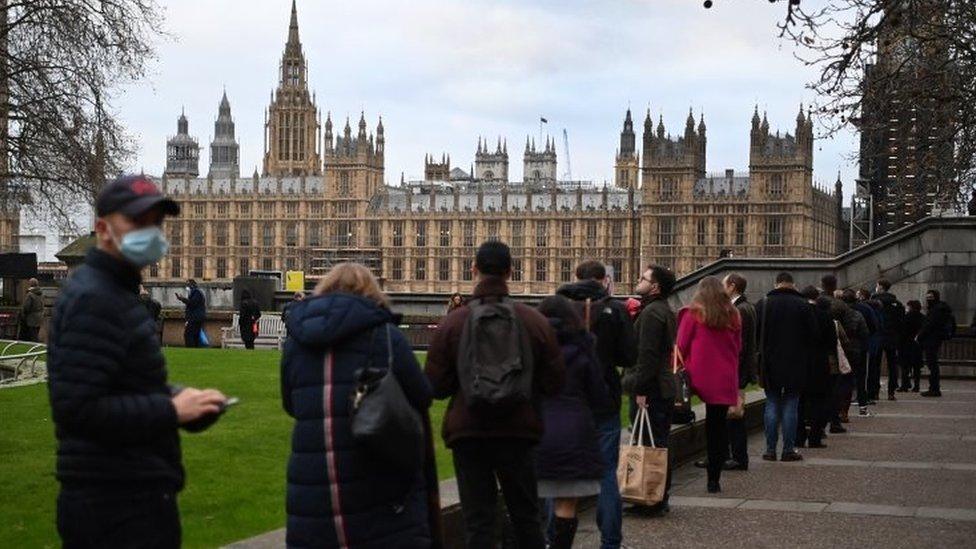Boris Johnson loses Covid argument with his own MPs
- Published

There were long queues at St Thomas's hospital - opposite the Houses of Parliament - for booster jabs
Boris Johnson didn't lose. But no prime minister wants to feel they're losing the argument in much of their own party.
And the scale of the rebellion is even worse than predicted. Not just a slap on the wrist for Mr Johnson, but a very serious rejection of his plan.
Something that can't be dismissed, despite his own personal appeals to his ranks.
Many of tonight's Tory rebels rejected the plan for Covid passes because of their instinct - a fundamental dislike in Conservative thinking of forcing people to do anything.
That's genuine, and strongly felt by many of them.
The resistance was also a real-life demonstration of Tory anger with many recent mistakes in Number 10 - bad judgements, bad handling - that has upset many backbenchers too.
But according to insiders, what we saw in the Commons is also evidence of a "deeper malaise". What, in some quarters in government, is starting to be called concern about a "Covid state".
The arrival of another Covid variant has, of course, prompted the government to act to try to protect the public's health.
If the Omicron outbreak is as enormous as the worst-case scenarios predict, much of the current political debate may be swamped, or indeed feel quickly irrelevant or self-indulgent.
But right now, Tory fears about the action ministers are taking are not just about the specifics of today's debate but about what many perceive as a lack of thinking about whether we can live like this for ever.
One insider said: "The trajectory we are on is to become a high-tax, high-spending, high-inflation country, and there seems to be little grip or strategy to address that underlying, big, big point."
The chancellor is understood to have raised concerns about the medium-term costs of handling the pandemic in the so-called "Covid O" meeting of senior ministers this week.
Several billion pounds has already been allocated to cover the cost of vaccines, boosters, and therapeutic drugs to help tackle Covid until next April.
But what about after that?
An ally of Rishi Sunak categorically ruled out the possibility of raising taxes again to help pay if this cycle continues, saying: "Whatever extra and unforeseen Covid costs come our way that are necessary to protect the British public, the chancellor will not be raising taxes to pay for them."
There is growing unease about what the next few months hold in store for the economy, with one government source suggesting winter to spring, "is going to be hell".
Even the former prime minister, Theresa May, who is developing a role as a spiky loyalist in the Commons, said recently: "Variants will continue to appear, year after year… We cannot respond to new variants by stopping and starting sectors of our economy, which leads to businesses going under, and jobs being lost."
The prime minister may have got his way tonight but not without political pain, nor with the prospect of relief from it soon.
Voters in the former MP Owen Paterson's seat will choose their next MP on Thursday.
It's extraordinary to imagine, but true, that there is a chance of the Tories losing their majority there, which stands at nearly 23,000.
Even more extraordinary is that some Conservatives might be happy to see it lost, to provide shock therapy to Number 10, not just to improve how it works but to do some hard thinking about what's coming next. One insider said: "I hope we lose it, because it would give them a real kick in the pants to say, this problem is very, very great."
With Omicron surging, philosophical concerns about this government on its own side may just have to wait.
Tonight's rebels may be out of step with much of public opinion and rising fears about the nation's health.
But no prime minister can ignore losing the argument with some of their own for long. Mr Johnson's massive majority, won only two years ago, no longer feels like something on which he can always rely.


